A daily part of tourism in ANY tourist area is tour groups. Whether the groups are from another state, another country or the church in the next town over, they arrive by the busload and give lots of money to the hotel and restaurant industries and, in the case of Central Florida, the theme park industry.
Although tour groups come to Orlando from a lot of places (Argentina, Peru, Paraguay, Uruguay, Asian countries, etc), the group that tends to gather the most reactions are the ones from Brazil. Those groups tend to be kids (girls more often than boys) in their mid-teens, they travel in groups of 25 or more and tend to have the same shirts, knapsacks, etc. They speak Portuguese, which sounds a bit like a cross between Spanish and Italian, but is not exactly the same.
A lot of the groups are girls celebrating their quinceañera, the Latinx coming-of-age-at-15 party; it’s the equivalent of a sweet 16 in the U.S. or a bar/bat mitzvah for Jewish kids. Years ago the all-important birthday was celebrated with a big party at home. But in the past couple of decades, trips to Walt Disney World have become all the rage for these young ladies who are turning “the big one-five,” and some families spend years saving for their girls to go on this once-in-a-lifetime trip.
These groups are huge, with tour groups bringing a few hundred to a thousand or more girls to Central Florida at one time. Fortunately, the groups are broken into smaller sub-groups of a few dozen, and each sub-group usually has at least one tour guide with them who carries a flag so their charges can see and recognize them.
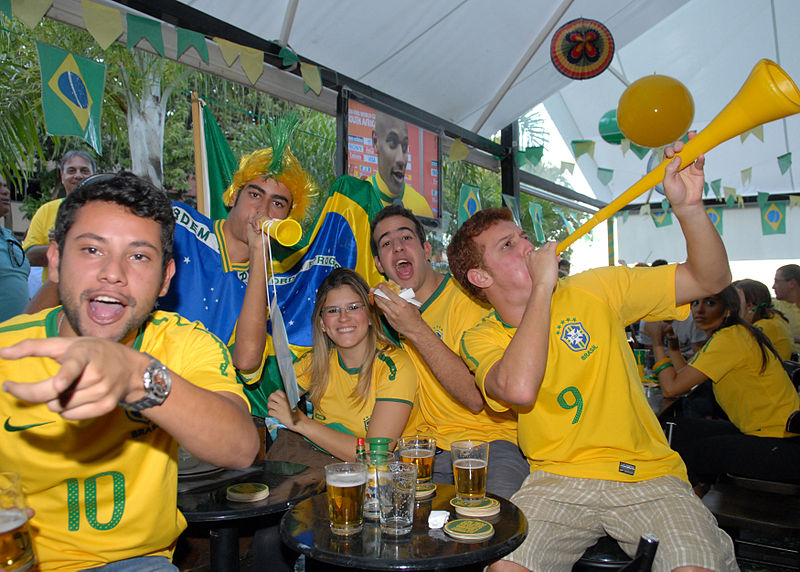
Brazilians are generally optimistic, happy and fun-loving people but some of the social and cultural norms of Brazilians are different from those of other countries such as the U.S., and the resulting behavior of these 15-year-old girls can sometimes make non-Brazilians bristle while in a theme park:
- Chanting in a group to pass the time
- Singing in a group because it’s fun
- Personal space is not super important (so they may put their hand on your shoulder or back as they pass by you)
These are on top of what happens when there is a “group” mentality, not a whole lot of adult supervision at any given time (one or two adults in his/her early-mid 20s supervising maybe 25-35 15y/o kids?), and, let’s face it, the self-centered mentality of a bunch of girls who are 15 years old ;-). So the resulting issues wind up being:
- Singing in the queues
- Chanting on the rides
- A group of 5 kids wanting to be with their friends, so the 5 kids in front of you in the queue, or sitting next to you at the parade are now 50 kids in front of or surrounding you.
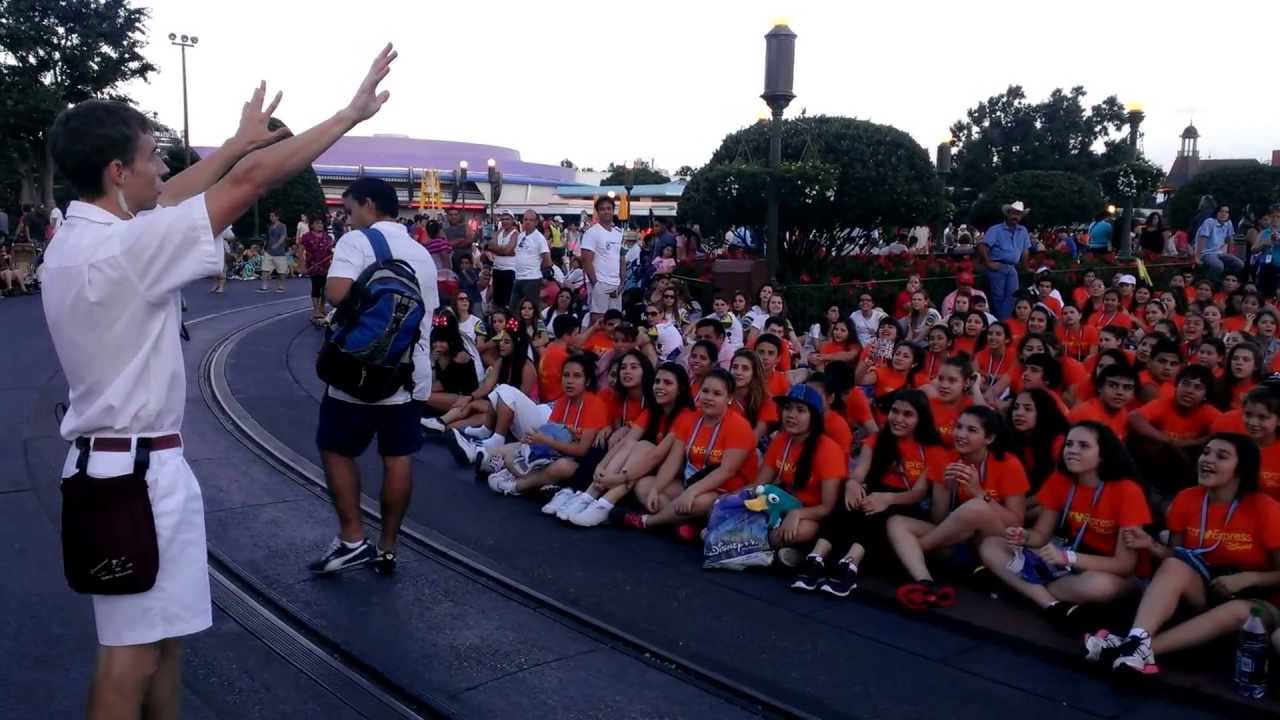
These situations can sometimes be, I know from my own experience, a little (or sometimes more than a little) frustrating. And it’s worsened because many of the kids don’t appear to speak English so most of us can’t really communicate with them. But to be honest, many the same kind of behaviors and “group mentality” are seen when groups of teenage American cheerleaders or dancers, school trip kids or even church trip kids are in the parks with what may or may not be enough adult supervision.
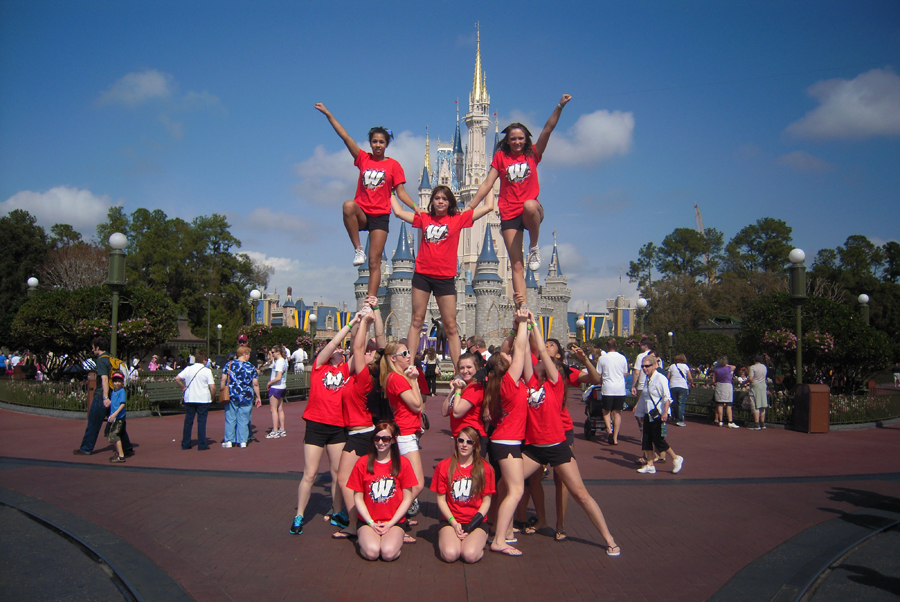
So What Can You Do About Them?
At Walt Disney World, at least, the groups from Latin America are supposed to have a Cast Member from Disney’s Cultural Representative Program on hand. These bilingual Disney representatives have responsibilities that may include:
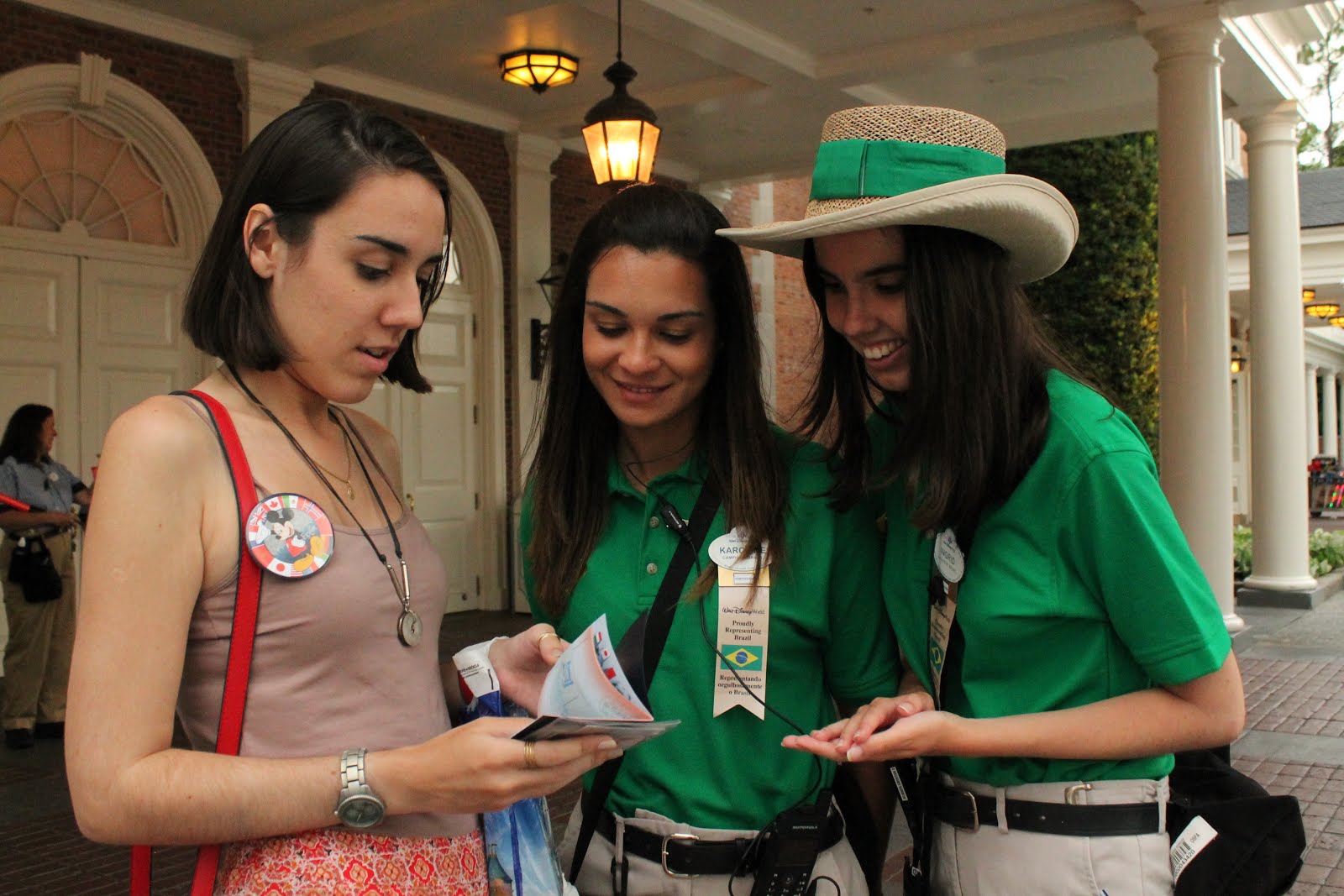
- Proactively seeking out guest contact
- Acting as a translator for leaders and cast
- Being able to work under pressure and overcoming guest objections
- Assisting with audience control including parades
I’ve seen these representatives at work at parades, restaurants, etc. and they do help diffuse potential problems before they happen. But they’re a little less effective when you’re queued for the Haunted Mansion, you’ve got 25 kids in front of you, 25 kids who are 10 people behind you, they’re trying to get together into one big group, and they’re all chanting as they enter the stretching room. So I’m well aware that sometimes you feel like you need to take matters into your own hands.
The most important thing to remember is your ability to “fix” the situation will be limited. It would be nice if these groups, usually comprised of kids, would act like what we would consider being responsible adults, but reality is that they’re not adults, their level of responsibility reflects that, and their social/cultural norms may not be the same as ours (which, quite honestly, isn’t right or wrong – it just “is”). So frankly, the thought that “it is what it is” is probably a good thing to keep in your head.
If the behavior of these larger groups of kids bothers you that much, my first suggestion is to try to avoid them as much as you can:
- Brazilian schools are out of session in the summer and in January, cheer and dance competitions have their own schedules and U.S. schools tend to have their trips at the end of the school year. You might not want to visit Central FL during those times, if possible.
- Tour groups tend to stay at the less expensive Disney-owned hotels. Moderate-or-above level Disney resort hotels or staying off property might be alternate options.
- If you see a tour group heading into an attraction or restaurant, go to a different one.
- Plan to eat at “off” times, when there are fewer crowds and, most likely, fewer tour groups trying to eat at the same time.
If there’s a group of kids all wearing the same shirt/knapsack/etc. in front of you in a queue and a group behind you and they want to all stand in line together in the front group, hold your ground if their trying to get in front of you bothers you that much. Tell them no. Tell them that the group in front can go back to be with their friends, if they want – and if they don’t appear to speak English, pointing and hand gestures can work just as well as talking. So does making a barrier of your party and perhaps the parties around you (if they’re of the same mindset).
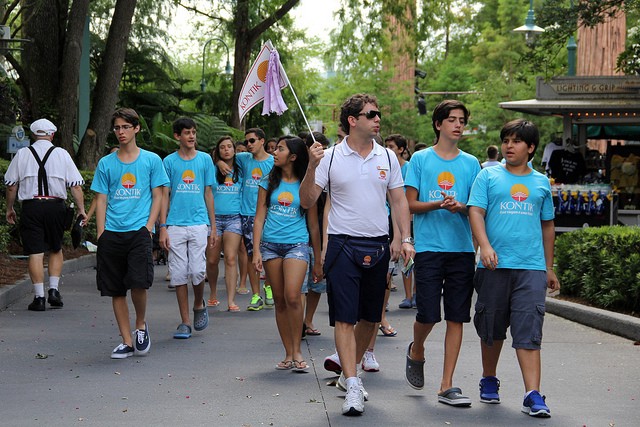
Telling their group leader or Disney’s Cultural Representative, if possible, may have some effectiveness. If you can’t locate him/her/them, telling the cast member/team member/employee who works at the attraction/restaurant/etc. about the problem may be able to help to a point, but I would think their hands are tied to an extent – their job is to keep everybody happy, not just you.
The bottom line is these tour groups have as much right to be there as we do and as much as we might like to see them change their behavior, the only peoples’ behaviors we can really change is our own. Whether that means visiting at a different time or opening your heart to an “it is what it is and I’ll just make the best of it” point of view, it’s up to us to ensure these tour groups don’t ruin our vacation.
Like this post? Please share it! We have plenty more just like it and would love if you decided to hang around and clicked the button on the top (if you’re on your computer) or the bottom (if you’re on your phone/tablet) of this page to follow our blog and get emailed notifications of when we post (it’s usually just two or three times a day). Or maybe you’d like to join our Facebook group, where we talk and ask questions about travel (including Disney parks), creative ways to earn frequent flyer miles and hotel points, how to save money on or for your trips, get access to travel articles you may not see otherwise, etc. Whether you’ve read our posts before or this is the first time you’re stopping by, we’re really glad you’re here and hope you come back to visit again!
This post first appeared on Your Mileage May Vary

27 comments
I’ve had personal experience with them at Kidcot stations. They tend to swoop in in large groups, shoving their Duffies at you to stamp and decorate, and sometimes pushing past families with small kids. They don’t intentionally, I hope, mean to be rude, but it’s sometimes hard to get them to form somewhat of a line and wait their turn. Most remember to say thank you, but not all. I do have problems with them moving in large clumps, blocking the pathways for other guests, and being quite loud. However, American cheer and dance teams do the same. So it’s not totally cultural. I do wish that the leaders of all these groups would be given some guidelines for park conduct, impart them to their groups, do daily reminders before they go off, and try to keep things under control.
That being said, I want them to have a good time, but not at the expense of other guests who have paid great sums of money to enjoy the parks too.
It’s a fine line and really, there’s no clear answer. Everyone who is there has paid to get in and has the right to enjoy the parks (and the restaurants. and the stores. and the…). Unfortunately, some cultures’ sense of enjoyment is different from others. The same goes for peoples’ ages, backgrounds, interests, etc. So who’s right and who’s wrong?
I remember becoming aware of the large tourist groups from Latin America back in the 90s. There were more and more every year and I vaguely remember hearing sometime in the early 2000s that because of the various complaints, the tour operators were limited in how many kids could be in each sub group (50 is better than 100?) and were taught about U.S. customs and culture…but I don’t know if that’s still done (although the groups are indeed smaller) or if what I “heard” was fact or fiction (because really, how much can you trust from what you read on the internets LOL)
At least at Disney they have staff dedicated to at least try and coral the inappropriate behavior. Down the street At SeaWorld it’s just a circus when they come. They are only concerned about the large amount of money they make off of these groups. They really don’t care about anything else. Having 500 people that don’t speak English and don’t care about anything but themselves in the same place is never a good thing. Nothing better than coming to work at a less than minimum wage job, at a place where the customer is always right, at a job you took because you are good at customer service only to feel alienated by guests and your fellow employees just cause you literally cannot help them if you wanted to. It’s is an absolute joke and it’s not getting any better anytime soon. Well… for us anyway. We don’t get massive tax, meal or lodging discounts or deals.
My family and I used to take in exchange students, and we took in some from Brazil. They are very social, it was important for them to be together as a group. I would come home from work to a house filled with Brazilian kids having a “party” (their word)
You can see the same thing with the large Latin American families that come to the parks, Grandpa and Grandma, all of their kids, and all of their grandchildren moving through the parks like a herd of cattle. They stay together as a group because they all want to be together.
It’s just a part of their culture, they are very warm, friendly, and social people who want to be together as much as possible, not just the kids, the adults are like that too. It is actually kinda nice to see, I think life would be better if our society was a little more like theirs. I admit that it can be a little frustrating, but I tend to cut them some slack.
“Having 500 people that don’t speak English”. It sounds like they all should speak English. I agree 100%. Being in the United States you should at least have a basic understanding of the English language. It is a matter of respect and reverence! At least a few words and phrases that helps you to communicate. Just remember to do the same when you travel outside of the US. As far as I know, less then 30% of Americans speak a second language, which is ashamed for one of the most powerful countries in the world! I’ve seen Americans in foreign countries behaving like: “Don’t these people speak English? Come on!” Seriously? It is amazing to be able to speak English, but how about you try a little bit of French, Spanish, Portuguese etc. At least try it! It is awesome! Please fellow Americans, don’t take it personal. This is a constructive critic. The USA is an amazing place with amazing people, but we are way behind the curve culturally.
Just allow cattle prods in the parks. They want to act like a herd, treat them like one.
I was at Disney recently and in fact there were large groups of African Americans all dressed with the same shirt, singing very loud and cutting lines . I was with two small children and 4 of them got in front of me and my family while we were in the line for 45 minutes. Then all of sudden, when we were about to go in, 15 more appreared and I didn’t let them pass anymore. There was also large groups of American teenagers singing loundly and dancing in the middle of the Park making very hard to walk , specially with a stroller. Off course this is not a “Brazilian” thing and much less cultural . Regardless I am certain that the parks are extremetely happy with all the large groups and the income they generate .
I’m sure they are, Candy – that’s why they have a whole division devoted to groups ;-). Their goal is to get as many people as possible to go to WDW. Our goal is to enjoy ourselves despite people who we find annoying. I hope some of the suggestions for the latter were helpful.
I’m happy you said that, because I was going to say the same thing. I’ve seen white Americans act the same way at Disney, as well as other cultures and ethnicities. It’s not just the Brazilian culture to be in groups and act in this kind of manner.
You’re a much better person than I am to be so tolerant, Sharon, although from your description, these kids can’t hold a candle to the mainland Chinese.
The same should apply during Springbreak, when pretty much all the young americans are gathering, drinking, using drugs and causing trouble somewhere around Mexico, right?
The fact that you directed this towards a group of people even while trying to be neutral at it display a rather racist and shallow approach tbh.
I agree that one’s mileage may vary, but if I were you I would try to amplify it a little bit.
I’m not sure how often you go to Walt Disney World, but there are indeed a lot of Brazilian tour groups during the time frames I mentioned. If tour groups from Germany or Dubai or Uganda were the ones making difficulties for other WDW guests, I would have mentioned those. But they don’t.
But yes, when and if I ever write about Spring Breakers in Mexico, I will mention Americans causing difficulties there, the same as I did the American cheerleaders at WDW.
I drive a bus for Disney, they are actually better behaved than when the groups of cheerleader from the us are here. I have a bunch of stories about the cheerleaders problems at the Disney resorts that are not so good. The Latin groups are more well behaved on the buses and at the resorts. I have no problems with them!
I understand all sides of the topic.
BUT…. when the tour groups are laying all over each other on Main Street sleeping waiting for a parade and or show… oh and when they get up and leave all their litter and garbage … THAT IS NOT RIGHT.
More than tour groups do both of those 😉
Reeks of “white american” i am better than them teas…..smh!!
This land is not yours, so quit tryna be a culture police miss thing. American teens are actually worse in behavior.
And how dare you say most of the brazillian kids in attendance have parents dat saved for a once in a lifetime trip…you sound silly. Another entitled selfish woman.
Hi Polypoly and thanks for writing!
Actually, I did mention – in fact, I even included a picture of – American teenage cheerleaders, who offer their own challenges to other guests visiting WDW.
And yep, although some of the Brazilian kids who come to WDW are from well-to-do families, others come from a life of lower income. So just like Americans, some families scrounge for that once-in-a-lifetime trip, some don’t. In doing the research for this post, I spoke to 3 friends of mine here in Orlando who are originally from Brazil (there are a bunch of them who’ve made the move!), so I feel pretty solid in what I said.
Also, are you sure you read the article? A good portion of it was explaining that the Brazilian culture was different from ours and that it’s not right or wrong, but just “is.” I’m not sure how you interpreted that to be “culture police,” but….
But again, thanks for writing! 🙂
Although she didn’t express herself in the most polite way, I do agree with one thing. The vast MAJORITY of kids attending those trips are from families that have good financial conditions. I speak as a Brazilian, and as someone who attended one of those trips when I was celebrating my 15th birthday.
Also I kind of agree, their behavior can get a little bothersome sometimes, but I really do think you have to take into account most of those kids are traveling internationally, by themselves, for the first time. It’s a whole new level of excitement. And they’re just coming into contact with that sense of freedom and don’t really know how to express that.
During my own trip, I often felt a little embarrassed about how over the top some of my friends acted, but at the end of the day, they’re just kids trying to have a good time.
Not sure the need to label the tour groups as Brazilian – as if large groups/parties at Disney are limited to Latinos – it’s ugly and unnecessary. You could’ve easily communicated your “How to avoid large parties while at Disney” without labeling the groups’ ethnicity. Your words carry weight, and in this heightened frenzy of hatred towards immigrants, maybe be more mindful of the words you choose.
Hi Cjmarin and thank-you for writing! You’re absolutely right, I could have. However it’s generally not, for example, the U.S. school trip groups or the European groups that cause issues for other guests; it’s the large groups of 15y/o girls from Brazil, and the American cheerleaders. If I were to say “how to avoid large parties at Disney,” it would be putting any large group into that category. That wouldn’t be fair to all the groups that actually do follow the social norms of the U.S.
So with that in mind (it’s generally kids from the United States and from one particular country), what do you think would be a good way to handle it that wouldn’t batch everyone into one group of “groups”?
I was in WDW once in July, never again. There were Brazilian kids galore there at that time, but I don’t remember them causing any commotion outside them nuzzling against you in line….which is annoying….they were no different than any other large group of kids would be. The reason we will never go again in July was the crowds and the unrelenting heat and humidity!
I’ve seen pretty loud US teenagers at the parks too. Funny how Brazilians are the only problem .
So have I, Viviane. I did mention one particular group of those American teenage kids in the post – even included a picture 😉
Thanks for writing!
Could somebody please tell me the schedule for these tour groups. I went on July 25 for the Villains After Hours party, and I saw them everywhere. Once while I was in Tomorrowland, a horde of them queued up for Space Mountain, WHICH WAS 128 MINUTES! Anyone with common sense should know this is not a good idea. I thought of hollering to them they’d be wasting their time, but I decided not to as they probably wouldn’t know or care.
Hi! I don’t know of any set schedule but:
“If the behavior of these larger groups of kids bothers you that much, my first suggestion is to try to avoid them as much as you can:
— Brazilian schools are out of session in the summer and in January, cheer and dance competitions have their own schedules and U.S. schools tend to have their trips at the end of the school year. You might not want to visit Central FL during those times, if possible.
— Tour groups tend to stay at the less expensive Disney-owned hotels. Moderate-or-above level Disney resort hotels or staying off property might be alternate options.
— If you see a tour group heading into an attraction or restaurant, go to a different one.
— Plan to eat at “off” times, when there are fewer crowds and, most likely, fewer tour groups trying to eat at the same time.”
Oh yes, and people who cannot sustain a logic and fact-based argument always cry “Racism.” Lazy, self righteous dullards!
I have lived and worked in 65 foreign countries and before departing I ALWAYS study the customs and traditions and learn a bit of the language because I RESPECT the people who live there. We have a right to expect the same.